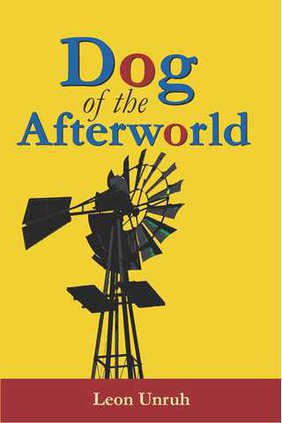As a recent transplant to Great Bend, getting to know the area and the people has been a constant activity for the past year and a half. So, when a copy of Dog of the Afterworld by Leon Unruh made it to my desk, I was intrigued.
While the novel focuses on crime, corruption and redemption, with romance and heroism liberally added, the theme is one of self-forgiveness and of the resilience and determination of the human spirit.
I wasn’t disappointed as I entered the world of Nikolai Fyodorov, a hired assassin for the Russian shadow government as he lay in wait for a turncoat on the docks of an Alaskan shipping port. Things go very wrong, and soon Nikolai is sent away with a new identity to take care of some, ahem, political business in Great Bend. Planes, buses and automobiles, as well as his well-toned shanks mare gets him to his destination where events occur that point him towards the fictional town of Sandstone, which closely resemble Pawnee Rock, the town where Unruh grew up.
“I wanted to write about the geography and history of Pawnee Rock, which my heart has never really left,” he wrote in an email.
Unruh’s website, PawneeRock.org, is all about those topics and how growing up in the town shaped his and the lives of others who have moved on, he said.
Nikolai’s observations inform the reader about what makes rural Western Kansas tick. Agriculture, water use, the ag and oil economy, and the history of the area come alive.
The attitudes, both political and practical, of the people he encounters, and his assassin’s observations of the location simmer down to a rich and tasty mixture that is both familiar and at the same time exciting and new.
From the somewhat stereotypical bigot Ragweed Lister to the damaged dreamer, Cimi Hernandez, Nikolai finds distractions that make him consider his past, and more importantly, his future.
The story is flavored with Russian spies and mafia, the FBI, assorted conservative and not as conservative politicians, militia leaders, white-collar criminals and human traffickers, everyday working people, waitresses, kidnapped teens and police and FBI agents.
As Nikolai prepares for the the job he was sent to do, he travels through Great Bend, which is described in precise detail. Readers familiar with the place will have fun following his maneuvers through the streets and along the rooftops of the central business district and along 10th street. The trip between Sandstone and Great Bend is full of familiar landmarks as well.
In fact, readers who know the area might question how so much can go wrong in a place like this. Unruh offers a fresh view of the things many take for granted, however, and by the end of the book, readers will find themselves wondering, “What if...”
One conversation between Nikolai and the friendly driver that transports him from Hays to Great Bend, has staying power through the story.
“Back when this was open country,” Henry said, “the families might have been crazy from the wind, but they behaved because they couldn’t hide any secrets.” He looked at Nick and raised his eyebrows as they passed another farm. “So here we are three or four generations later and new families live in trailer houses with satellite dishes next to where the old homes used to be, and the shelterbelts have grown up into thirty-foot privacy fences and lots of stuff happens behind those trees.”
Unruh spent much of his high school years in Great Bend as a member of the Argonne Rebels.
“I bought my first 10-speed at Gamble’s on Main Street and had my senior picture made at Brannan’s Studio, where I got all my darkroom supplies,” he said. His first published photograph of a burning farm shed was printed in the Great Bend Tribune, and he has many fond coming of age memories from Pawnee Rock and Great Bend.
“All of these things played a part in how I feel about Great Bend and the way I described it,” he said. Today, Unruh lives in Alaska, and is the editor at the Alaska Native Language Center at the University of Alaska Fairbanks. But he still manages and updates PawneeRock.org and makes it back to the area every couple of years.
The surprise ending of “Dog of the Afterworld” leaves the door open for the possibility of a sequel, perhaps even a teaming up of Nikolai and Cimi, and Unruh hopes to broaden the scope of the locations they visit, but for providing a stage for telling the truth through fiction, Unruh feels Kansas is ideal.
“The state is larger than life — a glorious and frightening combination of agriculture, basketball, climate, politics, lunatics and geography — and there’s a richness in the way Kansans feel about living in the crossroads of the continent,” he said.
Dog of the Afterworld is available in paperback through QuincyPress.com, an Emporia publishing company, for $15. It’s also available from private booksellers Watermark Books in Wichita, Town Crier in Emporia, and Raven in Lawrence, and through Kindle for $8.99.
Novel Dog of the Afterworld spotlights Barton County
Unruh, Pawnee Rock son, spins tale of spies, corruption, human trafficking and romance





